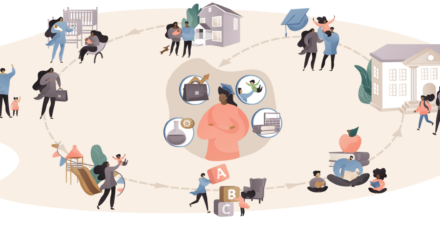A growing body of evidence shows that investments in high-quality, affordable, and accessible childcare and learning are a key element of a healthy, growing U.S. economy. Research tells us that the ages zero to three are a critically important time for developing the wide range of skills necessary for future success. Equitable Growth is growing the evidence base for the demand side of the early education equation—what do families need and want for their children and themselves and what are the obstacles to access across the economic distribution—and the supply side of the equation—what does quality childcare look like, and how do we expand access to quality early care and learning jobs in a way that creates meaningful economic security for care workers?
Featured work
Child care prices, inflation, and the end of federal pandemic-era aid in five charts
May 8, 2023
May 8, 2023
What is social infrastructure, and how does it support economic growth in the United States?
January 26, 2023
January 26, 2023
Factsheet: What the research says about the economics of the 2021 enhanced Child Tax Credit
November 29, 2022
November 29, 2022
Advancing research and evidence on child care and U.S. economic growth
November 10, 2022
November 10, 2022
Factsheet: What the research says about the economics of early care and education
September 15, 2021
September 15, 2021
Explore Content in Childcare & Early Education216
Access to Paid Leave during the Covid-19 Pandemic: Evidence from NYC
January 4, 2021
January 4, 2021
Did Paid Sick Leave and Family Medical Leave Ameliorate the Health and Economic Effects of the COVID-19 Pandemic?
January 4, 2021
January 4, 2021
New research shows the impact of 2020 job and income losses on family dynamics and parents’ mental health in vulnerable households
December 14, 2020
December 14, 2020
Impact of the COVID-19 Crisis on Family Dynamics in Economically Vulnerable Households
December 14, 2020
December 14, 2020
Filling critical gaps in child care research to support effective and equitable reforms to help U.S. families and workers alike
December 2, 2020
December 2, 2020
Public investments in education can spur equitable growth, pay for themselves, and create jobs for a stronger economic recovery
October 27, 2020
October 27, 2020
Achieving universal paid family and medical leave in the United States
August 24, 2020
August 24, 2020
Child care is essential for working parents, but is the industry ready and safe to reopen?
July 16, 2020
July 16, 2020
The Impact of COVID-19 on the U.S. Child Care Market: Evidence from Stay-at-Home Orders
July 16, 2020
July 16, 2020
New working paper shows long-term U.S. economic and health benefits of the Supplemental Nutrition Assistance Program
May 11, 2020
May 11, 2020
Is the social safety net a long-term investment? Large-scale evidence from the food stamps program
May 11, 2020
May 11, 2020
Explore the Equitable Growth network of experts around the country and get answers to today's most pressing questions!















